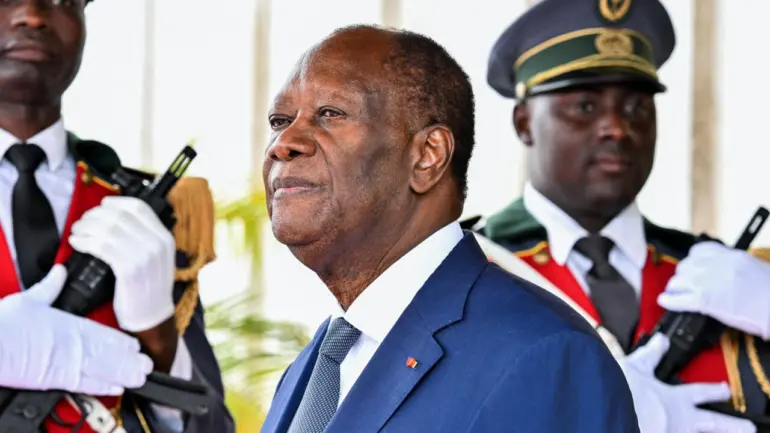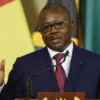Ivorians went to the polls on Saturday to choose between incumbent President Alassane Ouattara, the overwhelming favourite seeking a fourth term in office, and an opposition weakened by the exclusion of its leading figures.
Ouattara, 83, has ruled the world’s top cocoa-producing nation since 2011, overseeing a period of economic growth that restored Côte d’Ivoire’s status as one of West Africa’s key economic powerhouses.
Nearly nine million Ivorians are eligible to vote in the election, which features five candidates and will determine whether Ouattara can secure victory without a run-off. Polls close at 6:00 p.m. (1800 GMT).
“The life of a nation depends on voting, that’s my only motivation,” said Ibrahim Diakité, a bus driver casting his ballot in a pro-Ouattara suburb of Abidjan.
However, the president’s main rivals, former president Laurent Gbagbo and ex-Credit Suisse CEO Tidjane Thiam, have been barred from contesting. Gbagbo was disqualified due to a criminal conviction, while Thiam was ruled ineligible after obtaining French nationality.
With opposition groups calling for protests and sporadic unrest already turning deadly, the government has imposed night-time curfews in some areas and deployed about 44,000 security personnel across the country.
Despite the tensions, many voters expressed cautious optimism.
“In previous years, there were more tensions than this year,” said Mamadou Bamba, an unemployed man in his fifties from Abobo.
“We are voting in peace today. Our hope is for the day to pass without incident,” added Séverine Kouakou, a 46-year-old voter in Bouaké, the nation’s second-largest city.
“It’s hard to imagine any surprises in this election since the opposition heavyweights aren’t participating,” said Gilles Yabi, director of the West African think tank WATHI.
Unrest and restrictions
Four people, including a police officer, have been killed in political unrest in recent weeks. On Monday, an independent electoral commission office was set ablaze.
In response, authorities have banned public demonstrations, while courts have sentenced dozens of people to three-year prison terms for disturbing the peace. Security forces have been heavily deployed, particularly in traditional opposition strongholds in the south and west.
A night-time curfew was also imposed on Friday and Saturday in the Yamoussoukro region, home to the country’s political capital. Officials say the measures aim to prevent “chaos” and a repeat of the deadly violence surrounding the 2020 presidential election, which left 85 people dead.
“I ask you to closely monitor your neighbourhoods. We must be ready to protect Côte d’Ivoire,” Ouattara said during his final campaign rally on Thursday.
“The election is frightening, but we dare to believe there will be more fear than harm,” said Ibrahime Kuibiert Coulibaly, head of the Independent Electoral Commission.
On Wednesday, Gbagbo denounced the vote as a “civilian coup d’état” and an “electoral robbery,” saying: “Those who could have won have been eliminated. I do not accept this,” though he stopped short of urging a boycott.
The candidates
None of Ouattara’s four challengers represents a major political party or wields a nationwide support base comparable to his ruling RHDP.
Former trade minister and agribusinessman Jean-Louis Billon, 60, hopes to draw backing from supporters of his former party, the Democratic Party of Côte d’Ivoire (PDCI).
Former first lady Simone Ehivet Gbagbo, 76, is seeking to rally her ex-husband’s loyalists, while the left-wing vote is expected to be divided between her and Ahoua Don Mello, a civil engineer and independent Pan-Africanist with pro-Russian leanings.
The only centrist in the race, Henriette Lagou, who also contested the 2015 election, is making another bid after securing less than one percent of the vote a decade ago.
Ouattara first came to power following the 2010–2011 post-election crisis that left more than 3,000 people dead during violent clashes between his and Gbagbo’s supporters.
His administration has since touted years of strong economic growth and relative stability despite jihadist threats along Côte d’Ivoire’s northern borders. Critics, however, argue that the benefits of this growth have been unevenly distributed and that rising living costs continue to strain ordinary citizens.
Nearly 1,000 domestic observers are monitoring the vote, alongside 251 representatives from the Economic Community of West African States (ECOWAS) and the African Union.
Official results are expected early next week.
AFP


